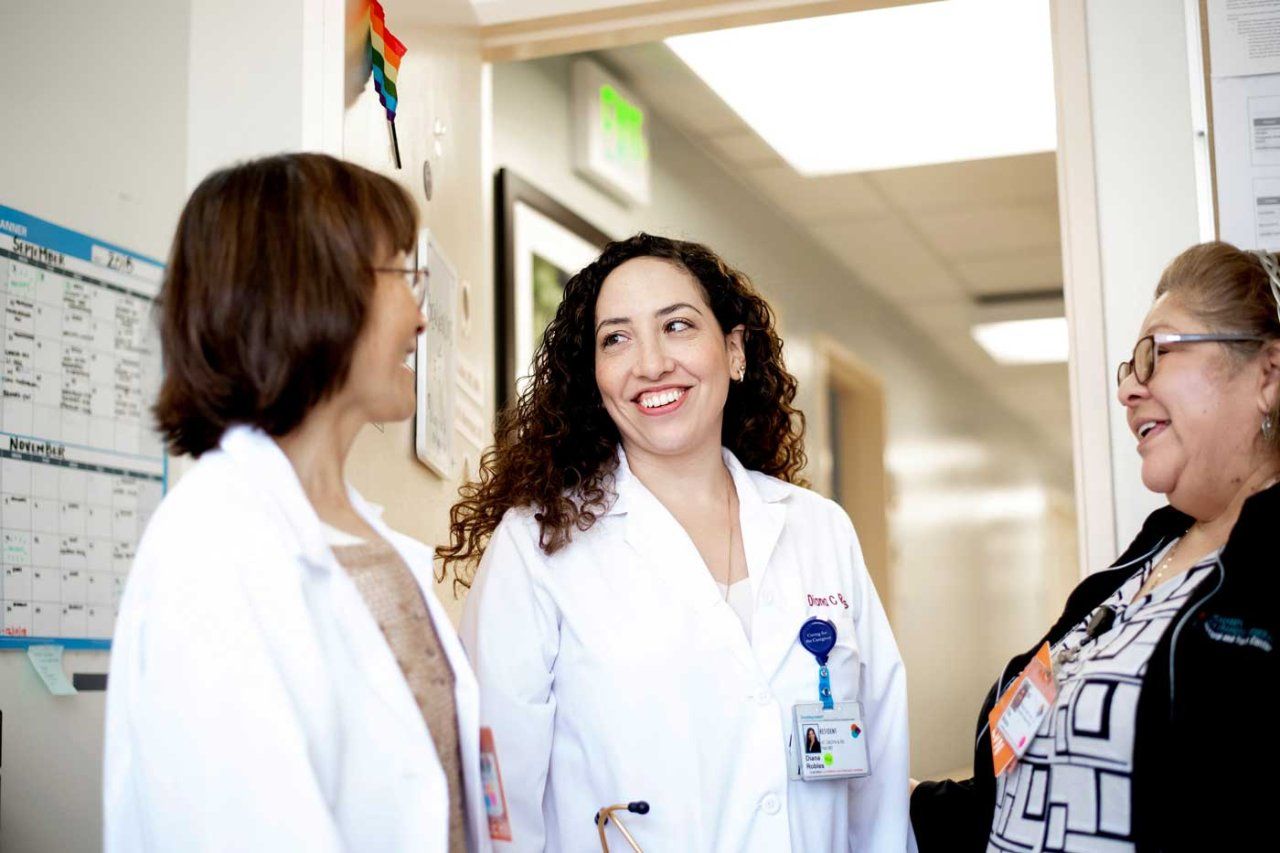UCSF Commits to Local Hiring Goal to Foster Economic Opportunity

UC San Francisco has committed to hiring 10% of new employees from underserved communities by the end of 2027, as part of its continued commitment to creating greater economic opportunity for the local community.
The commitment is part of UCSF’s work with the Healthcare Anchor Network (HAN) and the National Fund for Workforce Solutions. HAN announced May 10, 2023, that UCSF is one of 17 HAN members around the country to sign an “Impact Workforce Commitment” (IWC) to improve the overall health and well-being of the local community.
The commitment includes hiring locally, as well as internal advancement for incumbents. UCSF also will implement financial security strategies for individuals who face barriers, such as low income, lack of access to education and training, and other socio-economic challenges. These efforts build on UCSF’s work as an anchor institution in the community.
“Too often, talented individuals from underserved communities are overlooked for jobs because of the many structural disadvantages that limit their access and ability to compete for employment,” said UCSF Chancellor Sam Hawgood, MBBS. “We are committed to leveling the playing field and recruiting people from diverse backgrounds, which will strengthen our public mission of advancing health worldwide and in the communities where we live.”
UCSF will invest in workforce development and career pathway programs, support employees to achieve financial stability and build wealth, and eliminate bias in career advancement. The commitment includes the full UCSF enterprise – the UCSF campus and UCSF Health system, including the UCSF Benioff Children’s Hospitals in San Francisco and Oakland.
“The Impact Workforce Commitment is an extension of our commitment to investing in our greatest asset – our people,” said Corey Jackson, JD, UCSF’s chief human resources officer, who oversees hiring for the UCSF campus and UCSF Health, and is co-sponsor of the commitment with Ellie Rossiter, interim vice chancellor of Community and Government Relations. “UCSF is committed to advancing excellence in staff recruitment and retention. For us, this means not only intentionally cultivating diversity at all levels within the organization, but also removing barriers in the hiring process for members of our community to gain access to stable, well-paying jobs available at UCSF.”
Financial Stability, Leadership Development
The Healthcare Anchor Network includes more than 70 health care systems nationwide that are working to build more inclusive and sustainable local communities. In addition to UCSF, the HAN network institutions adopting the Impact Workforce Commitment include Advocate Aurora Health, Baystate Health, Bon Secours Mercy Health, CHRISTUS Health, Cleveland Clinic, CommonSpirit Health, Dartmouth Health, Fairview Health Services, Froedtert Health, Hawaii Pacific Health, Intermountain Health, Providence, Rush University System for Health, The MetroHealth System, University Hospitals in Cleveland, and University of Utah Health.
“The commitment by the 17 health systems represents a significant step towards promoting equity and opportunity in the health care sector,” HAN President David Zuckerman said in announcing the commitment. “By providing stable jobs, benefits, and career ladders for lower-income individuals, these health systems are not only making a positive impact on the lives of their employees but also the communities they serve.”
The key provisions of the HAN Impact Workforce Commitment include:
-
Reaching at least 10% of new hires annually as “impact hires” by the end of 2027. These are employees hired from economically disadvantaged areas who connect to the organization through intentional pathways into jobs that do not require a bachelor’s degree. This includes building and expanding partnerships, programs and initiatives with community organizations, as well as removing unnecessary education and experience qualifications from job descriptions.
-
Increasing the number of employees promoted from positions requiring less than a bachelor’s degree into higher skilled, higher wage roles by 2027 through direct investment in workforce development. Investments could include apprenticeships, earn-and-learn programs, tuition advancement, and other initiatives and internal policy changes. UCSF will focus on individuals currently working in lower-wage health care occupations (e.g., medical assistants, home health aides, nursing assistants, etc.).
-
Conducting policy advocacy to accelerate workforce development investment in the public sector.
-
Creating a dedicated program for employees to support financial stability. IWC signatories will implement strategies to help employees achieve long-term financial stability, such as autoenrollment in 403(b) or 401(k) programs to build retirement savings.
-
Ensuring fair and equitable opportunities for leadership development and career advancement at all university and health system levels through intentional workforce development programs and by continuing to diversify staff at all levels to be more reflective of the communities we serve.
The key provisions of the HAN Impact Workforce Commitment include:
-
Reaching at least 10% of new hires annually as “impact hires” by the end of 2027. These are employees hired from economically disadvantaged areas who connect to the organization through intentional pathways into jobs that do not require a bachelor’s degree. This includes building and expanding partnerships, programs and initiatives with community organizations, as well as removing unnecessary education and experience qualifications from job descriptions.
-
Increasing the number of employees promoted from positions requiring less than a bachelor’s degree into higher skilled, higher wage roles by 2027 through direct investment in workforce development. Investments could include apprenticeships, earn-and-learn programs, tuition advancement, and other initiatives and internal policy changes. UCSF will focus on individuals currently working in lower-wage health care occupations (e.g., medical assistants, home health aides, nursing assistants, etc.).
-
Conducting policy advocacy to accelerate workforce development investment in the public sector.
-
Creating a dedicated program for employees to support financial stability. IWC signatories will implement strategies to help employees achieve long-term financial stability, such as autoenrollment in 403(b) or 401(k) programs to build retirement savings.
-
Ensuring fair and equitable opportunities for leadership development and career advancement at all university and health system levels through intentional workforce development programs and by continuing to diversify staff at all levels to be more reflective of the communities we serve.